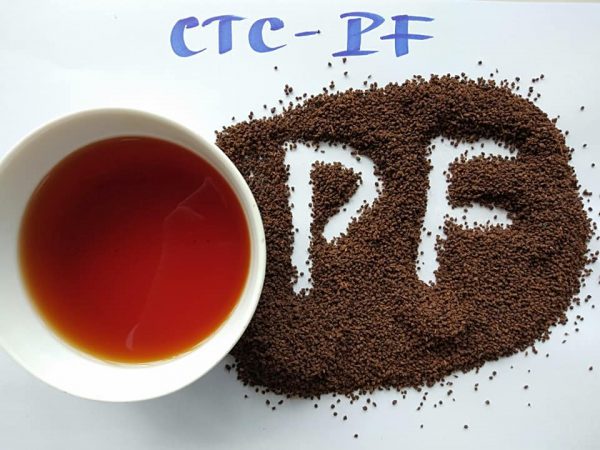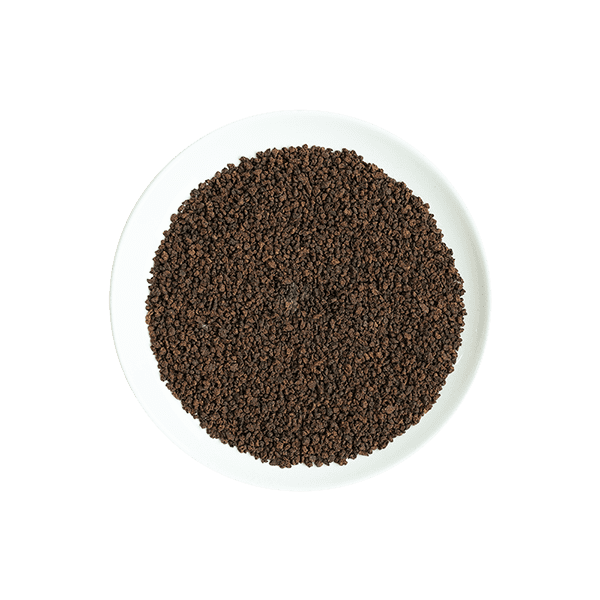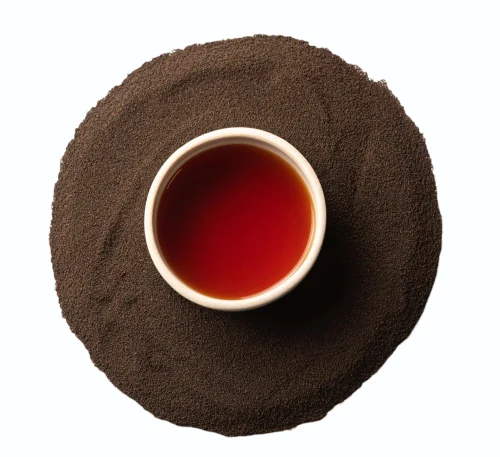Tin tức
CTC Black Tea – PF: Production Process, Differentiation, Health Benefits and International Market Trends
CTC Black Tea – PF is a specific grade of black tea processed using the Crush, Tear, Curl (CTC) method, resulting in small, uniformly sized particles known as Pekoe Fannings (PF). This grade of tea is known for its robust flavor, quick brewing time, and versatility, particularly in the production of tea bags. In this article, we will explore the intricate process of producing CTC Black Tea – PF, how it compares to other CTC grades, its health benefits, and its significant role in the global tea market. We will also examine the factors that influence its quality and the international standards that govern its production and distribution.

Contents
- 1 Introduction to CTC Black Tea – PF
- 2 The Production Process of CTC Black Tea – PF
- 3 Differentiating CTC Black Tea – PF from Other Grades
- 4 Health Benefits of CTC Black Tea – PF
- 5 Applications of CTC Black Tea – PF in Tea Bag Production
- 6 Market Trends and Consumption of CTC Black Tea – PF on the International Market
- 7 Factors Affecting the Quality of CTC Black Tea – PF
- 8 Quality Standards and Certifications for CTC Black Tea – PF
Introduction to CTC Black Tea – PF
CTC Black Tea – PF represents a crucial segment within the broader category of CTC (Crush, Tear, Curl) black teas. The “PF” designation stands for Pekoe Fannings, a fine, granular tea that is smaller than Broken Pekoe (BP) but larger than Pekoe Dust (PD). This tea is prized for its strong, brisk flavor and its quick infusion time, making it a preferred choice for tea bags and other ready-to-drink tea products. In the global tea market, PF plays a vital role due to its balance between flavor intensity and cost-effectiveness, particularly in mass-market applications.
The Production Process of CTC Black Tea – PF
The production process of CTC Black Tea – PF is what gives it its distinct characteristics. The CTC method, developed in the 1930s, was designed to meet the demand for a more efficient and consistent way of processing tea. The method involves three main steps: crushing, tearing, and curling the tea leaves.
- Crushing: Freshly plucked tea leaves are fed into CTC machines where they are crushed by cylindrical rollers equipped with sharp teeth. This step breaks down the leaves into smaller pieces.
- Tearing: The crushed leaves are then torn into even smaller pieces, ensuring uniformity in size.
- Curling: Finally, the torn leaves are curled into tiny pellets or granules, enhancing their ability to release flavor quickly when brewed.
For PF grade, the granules are sifted to retain only those of a specific size, larger than PD but smaller than BP. This meticulous sorting process ensures that PF maintains its reputation for consistency in flavor and brewing time, making it an ideal choice for tea bags, which require a quick, strong brew.

Differentiating CTC Black Tea – PF from Other Grades
Understanding the unique qualities of CTC Black Tea – PF requires a comparison with other grades of CTC tea. Each grade is defined by the size of the granules, which in turn affects the flavor, strength, and brewing time.
- Broken Pekoe (BP): This grade consists of larger granules than PF, resulting in a slightly milder flavor and longer brewing time.
- Pekoe Fannings (PF): PF offers a balance between strength and quick brewing, making it suitable for tea bags and mass-market products.
- Pekoe Dust (PD): Smaller and finer than PF, PD provides a very strong, quick brew, often used in instant teas or where a bold flavor is desired.
The PF grade stands out due to its versatility. It delivers a strong, brisk flavor that is not as overpowering as PD, yet it brews faster than BP. This makes PF a popular choice for blending with other teas or flavors, as well as for producing high-quality tea bags that need to infuse quickly and evenly.
Health Benefits of CTC Black Tea – PF
Like other black teas, CTC Black Tea – PF is rich in antioxidants, particularly flavonoids, which are known to offer numerous health benefits. The processing of PF grade tea ensures that these beneficial compounds are preserved and concentrated, making it a healthy choice for regular consumption.
- Cardiovascular Health: Flavonoids in black tea have been linked to improved heart health by reducing blood pressure and cholesterol levels. Regular consumption of PF tea can help maintain cardiovascular health.
- Digestive Health: The polyphenols in PF tea can promote healthy digestion by enhancing the growth of beneficial gut bacteria and reducing the risk of digestive disorders.
- Weight Management: The caffeine and antioxidants in PF tea can boost metabolism, aiding in weight management by increasing fat oxidation and energy expenditure.
These health benefits make CTC Black Tea – PF a valuable addition to a balanced diet. Its robust flavor also means it can be enjoyed without the need for added sugars or sweeteners, further enhancing its health profile.

Applications of CTC Black Tea – PF in Tea Bag Production
One of the primary applications of CTC Black Tea – PF is in the production of tea bags. The size and consistency of PF granules make them particularly well-suited for this purpose.
- Quick Brewing: The small, uniform size of PF granules ensures that the tea brews quickly, releasing a strong flavor in a short amount of time. This is essential for tea bags, where convenience and speed are key factors.
- Flavor Retention: Despite the quick brewing time, PF tea retains a robust flavor, making it ideal for consumers who prefer a strong cup of tea without the need for prolonged steeping.
- Cost-Effectiveness: PF is more cost-effective than larger grades like BP, making it an economical choice for large-scale production while still delivering a high-quality product.
To optimize the use of CTC Black Tea – PF in tea bags, manufacturers often blend it with other teas or flavors to create a balanced, appealing product. This blending process allows for the creation of a wide variety of tea bag offerings, catering to different tastes and preferences.
Market Trends and Consumption of CTC Black Tea – PF on the International Market
The international market for CTC Black Tea – PF is robust, driven by its popularity in regions where strong, quick-brewing tea is preferred. PF is particularly popular in South Asia, Africa, and the Middle East, where it is commonly used in both traditional tea preparations and modern tea products like tea bags and instant teas.
- Growth in Tea Bag Market: The convenience of tea bags has led to increased demand for PF grade tea, especially in Western markets where tea consumption is rising.
- Health-Conscious Consumers: As consumers become more health-conscious, the demand for black tea, known for its health benefits, continues to grow. PF, with its strong flavor and quick brewing time, fits well into this trend.
- Expansion in Emerging Markets: Emerging markets in Asia and Africa are seeing a rise in tea consumption, with PF being a key player due to its affordability and versatility.
The growing popularity of tea bags and ready-to-drink teas suggests a bright future for CTC Black Tea – PF. Its ability to meet the demands of modern consumers for both convenience and quality ensures that it will remain a staple in the global tea industry.

Factors Affecting the Quality of CTC Black Tea – PF
The quality of CTC Black Tea – PF is influenced by several factors, from the conditions in which the tea is grown to the techniques used in its production.
- Geographical and Climatic Conditions: The region where the tea is cultivated significantly impacts its flavor and quality. Tea grown in higher altitudes typically has a more complex and nuanced flavor, while tea from warmer, lower regions tends to be stronger and more robust.
- Cultivation Techniques: The methods used in growing and harvesting the tea leaves also play a crucial role in determining the final quality of PF tea. Selective plucking of the youngest leaves and careful handling during processing are essential for maintaining the desired flavor profile.
- Processing Precision: The CTC process itself must be carefully controlled to ensure that the PF grade retains its consistent granule size and strong flavor. Any variation in the crushing, tearing, or curling stages can affect the quality of the final product.
By understanding and optimizing these factors, tea producers can ensure that CTC Black Tea – PF meets the high standards expected by both consumers and regulatory bodies.
Quality Standards and Certifications for CTC Black Tea – PF
To ensure the highest quality, CTC Black Tea – PF must adhere to various quality standards and certifications. These standards not only guarantee the tea’s safety and consistency but also enhance its marketability.
- ISO Certifications: Compliance with ISO standards ensures that the production process is consistent and meets international quality benchmarks.
- Fair Trade Certification: This certification indicates that the tea has been produced under fair labor conditions, with fair wages paid to workers, and sustainable practices employed.
- Organic Certification: Organic certification is becoming increasingly important as consumers seek products free from synthetic pesticides and fertilizers. Organic PF tea meets these requirements, appealing to health-conscious and environmentally aware consumers.
These certifications play a crucial role in the global trade of CTC Black Tea – PF, helping producers access premium markets and build trust with consumers.
CTC Black Tea – PF is a vital component of the global tea market, offering a perfect balance of strong flavor, quick brewing time, and cost-effectiveness. From its production process to its applications in tea bags and its health benefits, PF grade tea is both versatile and highly valued. As market trends continue to evolve, particularly with the rise in health-conscious consumption and the demand for convenient tea products, CTC Black Tea – PF is well-positioned for continued growth and success. By adhering to strict quality standards and optimizing production techniques, producers can ensure that this grade of tea remains a staple in the tea industry for years to come.
